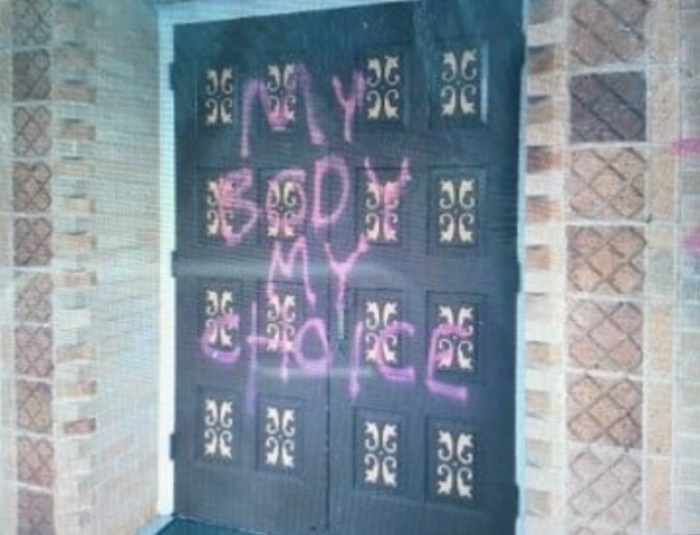Colorado church vandalized with pro-choice graffiti: 'My body, my choice'

A Catholic church in Colorado was vandalized with graffiti expressing support for the pro-choice movement just days after the U.S. Supreme Court upheld a pro-life law in Texas that bans abortion at the point when a baby's heartbeat can be detected.
St. Louis Catholic Church, located in the Boulder suburb of Louisville, became the target of vandalism from abortion activists over the weekend. The doors to the church were spray-painted with the declaration “My body, My choice,” a common refrain among pro-choice activists. Church members discovered the graffiti when they gathered for worship on Sunday morning.
In addition to spraying the phrase “My body, my choice” on the church's doors, vandals targeted a marker on the property that read “Respect Life,” replacing the word “Life” with the phrase “Bodily Autonomy.” Additionally, the sign at the front of the church was defaced with the phrase “bans off our bodies.”
In a Facebook post on Monday, the Louisville Police Department noted that a surveillance camera recorded three individuals on the church property at 1:30 a.m. local time Sunday and asked the public for help with identifying them.
In a statement, Louisville Police Chief Dave Hayes denounced the vandalism: “The actions of these individuals are not representative of the residents of Louisville, nor do they reflect the mission of our city.”
“The true representation of the community in Louisville are those that surrounded St Louis Catholic Church and helped remove the graffiti Sunday after Mass,” he added.
The vandalism comes four days after the Supreme Court allowed a Texas law banning most abortions after six weeks into a pregnancy to take effect.
Known as Senate Bill 8, the law went into effect on Sept. 1 and bans abortions after a baby's heartbeat is detected, usually around six weeks gestation.
Additionally, the law allows private citizens to file lawsuits against abortion providers as well as anyone suspected of aiding in the acquisition of an illegal abortion.
“Today is a historic and hopeful day,” said Human Coalition Action Texas Legislative Director Chelsey Youman in a statement in response to the Supreme Court allowing the Texas law to take effect.
“Texas is the first state to successfully protect the most vulnerable among us, preborn children, by outlawing abortion once their heartbeats are detected. A fetal heartbeat is a clear and scientifically acknowledged sign of human life.”
Litigation against the state law is ongoing and pro-choice elected officials have vowed to champion federal legislation that could overrule the Texas regulations.
House Speaker Nancy Pelosi, D-Calif., released a statement last week calling the Texas law “the most extreme, dangerous abortion ban in half a century,” adding that “this ban necessitates codifying Roe v. Wade.”
Pelosi said that after their recess concludes, “the House will bring up Congresswoman Judy Chu’s Women’s Health Protection Act to enshrine into law reproductive health care for all women across America.”
The Catholic Church is an outspoken opponent of abortion, with paragraph 2271 of the Catechism of the Catholic Church declaring that “Direct abortion, that is to say, abortion willed either as an end or a means, is gravely contrary to the moral law.” The Catechism also describes formal cooperation in an abortion as a “grave offense.”
Earlier this year, the U.S. Conference of Catholic Bishops voted to approve a “Document on the Meaning of the Eucharist in the Life of the Church,” which was characterized by pro-choice activists as a rebuke to Catholic politicians who support abortion and an attempt to prevent them from receiving communion.
Following criticism, the USCCB clarified that the document was “not meant to be disciplinary in nature,” emphasizing that “there will be no national policy on withholding communion from politicians.”
According to the pro-abortion Guttmacher Institute, Colorado is one of seven states that does not have any gestational limits on abortion, meaning that a woman can have an abortion up until the moment of birth. Last year, Colorado voters rejected a referendum supported by the pro-life movement that would have banned abortions after 22 weeks gestation.




























